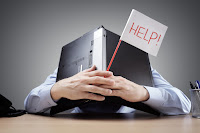WHEN
PRODUCTIVITY GOES OVERBOARD
Mario
D’Couto
Once upon a time, there were 2
woodcutters named Peter and John. They were often at loggerheads over who
chopped more wood. So one day, they decided to hold a competition to determine
the winner. The rules were simple – whoever chops the most wood in a day
wins.
So the next morning – both of
them took up their positions in the forest and started chopping away in their
fastest possible speed. This lasted for an hour before Peter suddenly stopped.
When John realised that there was no chopping sound from his opponent’s side,
he thought, ‘Ah ha! He must be tired already!’ and he continued to cut
down his trees with double the pace.
A quarter of an hour passed and John
heard the opponent chopping again. So both of them carried on synchronously. John
was starting to feel weary when the chopping from Peter stopped once again.
Feeling motivated and smelling victory close by, John continued on, with a
smile on his face.
This went on the whole day. Every
hour, Peter would stop chopping for 15 minutes while John kept going relentlessly.
So when the competition ended, John was absolutely confident that he would be
victorious only to later find that Peter had actually cut more wood. John
exclaimed, “How did this happen? How could you have chopped down more trees than
me? I heard you stop working every hour for 15 minutes!” to which Peter then
replied, “Well, it’s really simple. Every time I stopped work, while you
were still chopping down trees, I was sharpening my axe.”

There is so much of focus on
productivity and hustling that we forget to take care of ourselves leading to
burnout, health issues, depression and so on. When we are committed, when we are
driven, when we want to win, self – discipline most often takes the form of
getting up earlier and getting more work done. But sometimes, the harder choice
is restraint, to know when to put in the effort and when to back off and use
that time to rest and rejuvenate. It’s about knowing how to manage the load
instead of throwing it on your shoulders without thinking. The desire to skip a
workout and the impulse to work out too much, both, come from the same place. It’s
a short – term bargain with long – term consequences, just as the cost of the
pleasure of the candy bar or the drug is paid for down the line which is with
interest (because you are paying for it both, with your life and your time).

You may think that you are getting
ahead by taking on a bit more by pushing a little further and you may even
think that it is impressive to push through the little warnings of pain but you’re
gravely mistaken. While our work is important and we are supposed to hustle, if
we do not take our foot off the gas from time to time, we will not last. Rest is
a priority and a necessity for life. It is not laziness or a useless waste of
time but rather it is a fundamental requirement for our health and survival. It
is part of our inner biological music, like the recapitulation of a theme in a
piano concerto or the new, changed chords when we hear a song’s melody a second
time and thus it can be used and is necessary to synchronize ourselves with our
body clocks. Yet in our ‘hustle culture’, this truth is easily
overlooked. The world will often tell us that if we want to get more done, we
must ‘work harder’, ‘burn the midnight oil’ or ‘sleep when you’re
dead’ but nothing could be further from the truth. Scientists have
discovered that there are bi – hourly, nightly and weekly rhythms of productive
rest embedded in our God – designed DNA. Ignoring these rhythms leads to
burnout, anxiety and unproductiveness.

Leonardo Da Vinci was attuned to
this rhythm of rest more than five hundred years ago, taking frequent breaks in
between sprints of painting as he once said, “To remain constantly at work
will diminish your judgment. Go some distance away because work will be in perspective
and a lack of harmony is more readily seen.” To cite a couple of modern
examples, 90% of more than 2000 employees at Sony reported increased
performance after taking breaks throughout their workdays. This same discovery was
made by the violinists in the study that led to the 10,000 hour rule (as
highlighted by Malcolm Gladwell in his book, ‘Outliers’). The top performing
violinists in that famed study shared 2 things in common, namely, they worked
harder in 90 minute blocks of deep work and they rested harder, taking breaks
in between each block of practice.

With that being said, if rest is so
vital, why is it that it is often ignored? Partly because we spend so much time
working with, for and around machines that we start to think we are one. We’re
not. We are human beings. We need rest in as much as we need food to live. Once
we understand even a little of how our body is designed, we can get more done
in less time, achieve wildly different peak experiences and make our sometimes
scattered, too often exhausted lives rhythmic and musical. If we know how to
rest, the simplest acts can become moments of pure pleasure.
The problem is too often rest is understood
as a motionless activity and while no doubt it is true to an extent since rest
can indeed involve no movement as in the case of sleep, yet there are other
forms of rest as can be seen in the following ways listed below,
- Mental (mental rest can include thinks
like solving a puzzle, reading a book, pursuing a creative project, drawing and
so on)
- Social (social rest, by the very word itself,
signifies socialising with one’s friends, relatives, co-workers all of which
brings some sort of respite from the struggles with work and just life in
general)
- Spiritual (spiritual rest involves spending
time in prayer with God, reading spiritual books, meditating and so on)
- Physical (physical rest can involve things
like going for a walk, a jog or just engaging in some form of physical
activity, sport or outdoor activity or an exercise routine which can help break
the monotony and the drudgery of work life)
Having said that, this reminds me of
a quote that fits in well with the above points we have seen which is, “If
you work with your mind, rest with your hands; if you work with your hands,
rest with your mind.” This is to say that if you’re a carpenter, it won’t
be very restorative for you to rest by chopping word. Conversely, if you are a
programmer sitting in front of a computer all day, it probably won’t be very
restorative for you to rest while reading news on your laptop.
Winston Churchill, who worked with
his mind as a phenomenally productive writer and statesman, understood the
value of resting with his hands. Churchill famously created more than 550
paintings in his lifetime and loved laying bricks outside his home. He once
said that an ideal day would consist of ‘200 bricks and 2000 words’. The
‘work’
of painting and bricklaying didn’t wear Churchill down. On the contrary, this
type of rest invigorated him. In one of his works entitled,
“Painting as a
pastime”, Churchill explained why,
“A man can wear out a particular
part of his mind by continually using it and tiring it, just in the same way he
can wear out the elbows of his coat …… The tired parts of the mind can be
rested and strengthened not merely by rest but by using other parts (which in
this case he is referring to other parts of the body).”

Interestingly, even from a spiritual
standpoint, we see that the Sabbath is the first ‘holy’ object in
history. In Genesis 2:2-3, we see that on the previous six days, God saw
everything that He made and deemed it ‘good’ but Sabbath was the first
thing God called ‘holy’, where God rested from all the work of creating
that He had done and blessed the seventh day and made it holy and He commanded
the Israelites to do the same by imitating His rhythm of working for six days and
resting on one as can be seen in Exodus 20: 8 -11.
When Jesus said that the Sabbath is
for man (Mark 2: 27), He was reminding us that the Sabbath is not about keeping
hundreds of rules. Rather, the Sabbath is about enjoying God and His good gifts
and declaring that we are no longer slaves to sin, employers, clients,
marketers, emails, smartphones or the constant demand for more. We are free. In
fact, we see Jesus embodying this rhythm of productive rest as can been in the
following instances,
1. He offered restorative breaks to His
disciples as they worked (Mark 60: 30-32)
2. He Himself practiced and followed
it (Mark 4: 38-39)
3. He affirmed the goodness of the
Sabbath (Mark 2:27)
Our Blessed Lord knew the rhythms of
rest would help us get more done for His glory and the good of others. In other
words, He recognized what centuries of scientific exploration have now empirically
proven: that rest is productive as we strive toward our goals. But He also
undoubtedly knew something science may never be able to prove and that is rest
is not just productive for our goals, it is also productive for our souls
because let’s face it, unless if our bodies and minds are physically rested, we
may not have the energy to pray or do what God has called us to do to the best
of our ability as D.A. Carson, the theologian and co-founder of the Gospel Coalition
once said, “You are morally obligated to try to get the sleep you need. Sometimes
the Godliest thing you can do in the universe is a good night’s sleep – not pray
all night, but sleep.”
Ultimately, the objective is not to
be fast and strong just for the moment but rather to be fast and strong for a
long time and that can happen only when we conserve our energy from time to
time be it physically, emotionally and spiritually.

It is important to keep in mind,
therefore, that while we want to keep winning, nothing left unchecked lasts for
long. Nobody without the ability to self-govern is qualified to govern and that
includes not just prodding yourself forward but also finding the time to rest, finding
balance, listening to your body when it tells you, ‘I’m about to break!’
as Goethe once said, “Absolute activity of whatever kind ultimately leads
to bankruptcy.” In other words, this is to say, that no one is
invincible, no one can carry on forever. To last, to be great, you have to
understand how to rest. But it is not just about rest but also knowing how and
when to relax and have fun. The most surefire way to make yourself fragile, to
cut your career short, is to be undisciplined about rest and recovery, to push
yourself too hard, too fast, to overtrain and pursue the false economy of
overwork. As we have begun the new year, may we never forget this aspect of our
lives that while we may be pumped and charged to achieve all the goals and
resolutions that we have set for ourselves, to remind ourselves to take our
foot off the gas and ‘sharpen our axe’ from time to time, so that
we don’t fall into the trap where our work life gets the better of us leaving
us depressed, anxious and burnt – out. Happy New Year!









